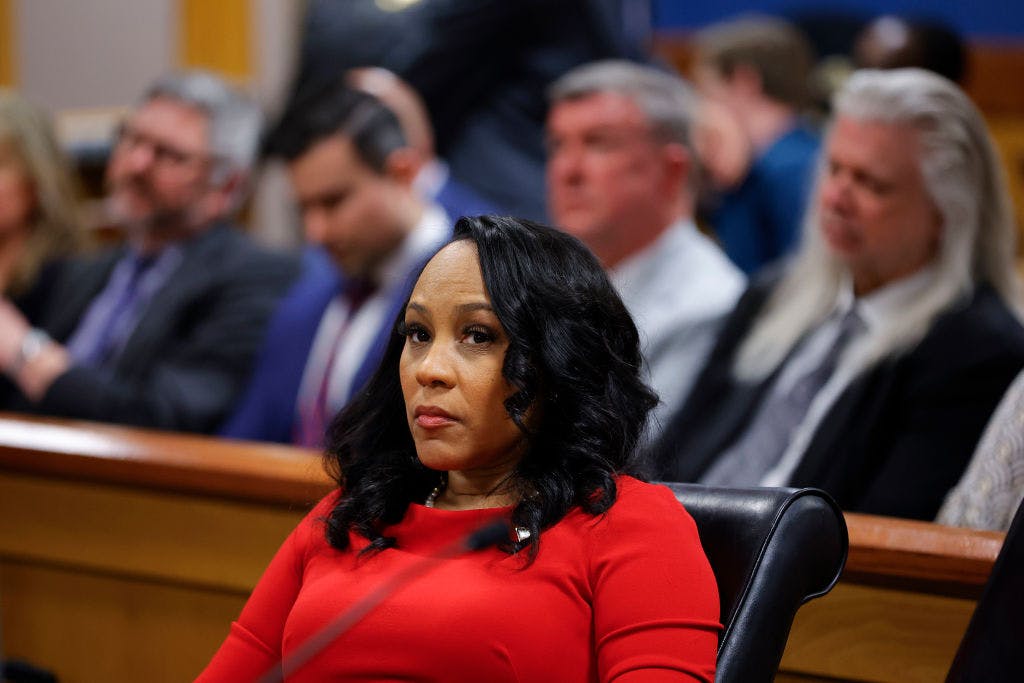Fani Willis and Justice Clarence Thomas Could Clash at the Supreme Court Over Disqualification From Trump Case
If Georgia courts decide that the district attorney’s secret affair is not disqualifying, the Supreme Court could be in the 45th president’s future.

The Georgia Court of Appeals’ coming decision as to whether District Attorney Fani Willis should be disqualified from her case against President Trump could preview a constitutional clash before the United States Supreme Court.
While an appeal to the high court is not yet ripe — the issue of whether Ms. Willis’s romantic affair with her special prosecutor, Nathan Wade, is disqualifying first must exhaust Georgia’s courts — the possibility that the Nine could hear of the couple’s romance is likely a disquieting, if speculative, possibility for Ms. Willis.
Mr. Trump could triumph before the Court of Appeals — his brief to that body is due next week. He is expected to advance two arguments for disqualification. The first is to allege that the personal and financial relationship between Ms. Willis and Mr. Wade amounted to a conflict of interest. The second is that Ms. Willis engaged in “forensic misconduct” by accusing her defendants of, among other things, “playing the race card.”
Those could be winning arguments that force Ms. Willis to withdraw. Appellate courts, though, usually treat lower court decisions with deference, especially when they center on fact-specific determinations, a reluctance to reverse that could lead Mr. Trump to turn to the highest court in the land.
For the case to reach One First Street, Mr. Trump would need to appeal, via petition for a writ of certiorari from the Georgia supreme court, which would be the next tribunal should the Court of Appeals keep Ms. Willis in her post. The assent of four justices would be required for a case to be added to the docket.
Mr. Trump is charged with violations of Georgia law, including the state’s version of the Racketeer Influenced and Corrupt Organizations Act. Under the 10th Amendment, powers not delegated to the federal government belong to the states — this covers most criminal law. The Constitution ordains that the “Times, Places and Manner” of holding federal elections belongs to the states, notwithstanding that Mr. Trump was president.
The decision by Georgia’s Court of Appeals to hear the issue at all is a significant victory for Mr. Trump after Judge Scott McAfee’s ruling that Ms. Willis could stay on once Mr. Wade resigned from the sprawling racketeering case. The appellate tribunal’s interest was likely piqued by Judge McAfee’s finding of a “significant appearance of impropriety” with respect to Ms. Willis’s conduct.
If Mr. Trump’s case against Ms. Willis does make it to the high court, it would not be the first time an argument in respect of Mr. Trump that appeared to be a long shot found its way to a hearing before the justices. The effort to disqualify the 45th president on the basis of the 14th Amendment’s Insurrection Clause worked its way to oral arguments from the legal hinterlands.
Mr. Trump beat back that challenge unanimously, convincing even the liberal justices that Colorado could not bar him as an insurrectionist. Then there is Mr. Trump’s claim that he is entitled to “absolute immunity” for official acts undertaken during his presidency. That position was rejected by a trial court judge, Tanya Chutkan, and the United States Court of Appeals for the District of Columbia Circuit. The justices, though, appeared open to it.
Federal law mandates that the Supreme Court can review rulings from the “highest court of a State in which a decision could be had.” The court explained in 1945, “Our only power over state judgments is to correct them to the extent that they incorrectly adjudge federal rights.” This is constitutional bedrock — the Framers were committed to federalism, meaning that state and federal prerogatives were both to be honored.
Mr. Trump has already once attempted to escape a state court for its federal counterpart. That came in the criminal hush money case now on trial at Manhattan. Judge Alvin Hellerstein, though, found that the allegations did not relate to Mr. Trump’s federal role because “Hush money paid to an adult film star is not related to a President’s official acts.”
One of Mr. Trump’s co-defendants at Fulton County is his erstwhile chief of staff, Mark Meadows. Mr. Meadows moved, unsuccessfully, for his case to migrate to federal court, arguing that his duties at the White House were beyond the purview of state criminal law. That was unsuccessful, an outcome that likely deterred Mr. Trump from undertaking a similar maneuver.
President Jefferson, though, fretted that the endless suits could hound the president “from pillar to post.” If Mr. Trump loses out in Georgia and can persuade the requisite justices that his federal rights — due process comes to mind — are at stake, Ms. Willis could soon plead her case before the likes of Chief Justice Roberts and Justice Clarence Thomas.

